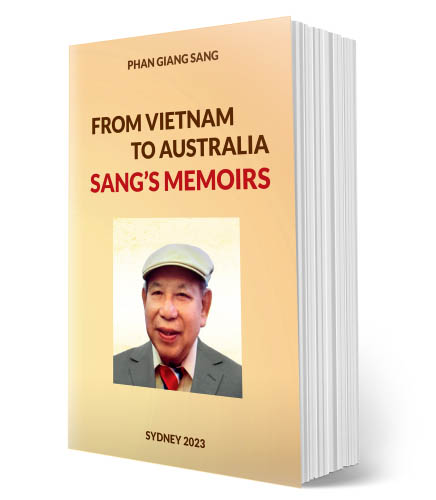Giới thiệu sách:
From Vietnam to Australia Sang’s Memoirs
Tác giả: BS Phan Giang Sang
UNSW Medicine & Health tổ chức buổi phát hành quyển sách ngày Thứ năm 14/12/2023.
From Vietnam to Australia Sang’s Memoirs
Overview: The book takes the reader on a trip starting from a small village of a South Vietnam province named Vĩnh Long in the early 1940s, to Brisbane in 1978, and then Sydney in 1982, until the present day. Historical events, wars, poverty, study, medical schools, love, and glory, all mingle in a well-recited memoir. This memoir celebrates the remarkable contribution of a refugee family to the Australian community.
History can be gleaned from various sources, and one fascinating avenue is through personal memoirs, such as the anthology penned by Dr. Sang Phan. His memoir, spanning over 250 pages, takes us on a journey from a small village in South Vietnam in the 1940s to Brisbane in 1978 and Sydney in 1982, right up to the present day. This well-narrated memoir weaves historical events, wars, poverty, education, medical school, love, and achievements into a rich tapestry of one individual’s life. While not authored by a historian, the book contains valuable factual insights, including a chapter on Saigon University of Medicine and Pharmacy. Dr. Phan’s generation, dedicated to knowledge and service to their homeland, shared aspirations with the author’s generation. This memoir captures the collective longing for a brighter future for Vietnam, and it is an essential read for younger generations.
Dr. Phan’s dedication to sharing this story, especially in a language he once knew little of, underscores his commitment to passing on the legacy of his people’s resilience. It’s also important to acknowledge the sacrifices made by his wife, Mrs. Tô Kim Châu, whose journey mirrors the determination of many women of her generation. Her unwavering support and sacrifices for her family are commendable. Dr. Phan ‘s memoir is a compelling blend of entertainment, emotion, and nostalgia.
Dr Phan is kindly giving the proceeds of his book back to UNSW Medicine & Health.
Preface: History can be learnt from different sources. One interesting source is via memoirs in the form of an anthology. Dr Phan Giang Sang’s memoir is of this type. Spanning over 250 pages, the book takes the reader on a trip starting from a small village of a South Vietnam province named Vĩnh Long in the early 1940s, to Brisbane in 1978, and then Sydney in 1982, until the present days. Historical events, wars, poverty, study, medical schools, love, and glory, all mingle in a well-recited memoir. The book is a recollection of a warm person who has lived his life in its full meaning, who values human lives more than anything. Though not written by a historian, the book contains valuable factual insights. The chapter on Saigon University of Medicine and Pharmacy gives a brief history (with valuable photos) of a medical institution and its founding professors. This medical school is unarguably the pride of a developing country still at war.
I am twenty years younger than Dr Phan Giang Sang. In the 1960’s when he became a medical student, I started primary school. However, his recollection brings a lot of memory. His generation and my generation, in our youth, aspired after knowledge and opportunities to use our knowledge to serve the motherland. When the war ended in 1975, though still in doubt, we had some little hope that between Vietnamese past hatred would be forgotten to spend all our effort to rebuild the country torn by war. Soon, we were all disappointed and gradually left the country when opportunities presented themselves, regardless of threats of death in the ocean or being caught and punished by the authoritarian regime.
At his age now, Dr Phan Giang Sang is entitled to full retirement to enjoy a peaceful life without much anxiety. To the contrary, he has spent the last few years working hard on the memoir. Instead of using an easy tool, his mother tongue or French (the language he has frequented since childhood), to write the book, he chose English, the language he knew very little on arrival in Australia, as he admitted in the book. I wonder why! An obvious answer that comes to my mind is the man still sees his duty to pass on the story to his children, grandchildren, and younger Australians (and citizens of other countries) of Vietnamese origin. Future generations need to learn how their ancestors fought for their life and how they sustained their aspiration for a brighter future for Vietnam.
It will be a defect if I do not mention his wife, Mrs Tô Kim Châu. It was very rare for a woman of her generation, who lived in a third-world country like Vietnam, to be educated at tertiary level. Being trained as a pharmacist, she must be a very intelligent woman. However, like millions of Vietnamese women after the war, she put aside all her ambitions and with dignity did all sorts of labouring jobs to support her family and young children, while her husband was in concentration camp. After their arrival to Australia, she again sacrificed for her family. In a recent article on The Conversation, Farjana Mahbuba (Australian Catholic University) depicted the arduous path that professional Bangladeshi women must endure in the new country. [Friday essay: ‘I trained to be an engineer … now I am a pickle seller’. What does migration do to a wife? The Conversation 21st April 2023.] The story is not new, even though Australia was much more generous with open arms to Vietnamese refugees more than four decades ago.
I read Dr Phan Giang Sang’s memoir with mixed feelings: entertainment, emotion, nostalgia… I strongly recommend the book.
Professor Thanh Tran
University of New South Wales

